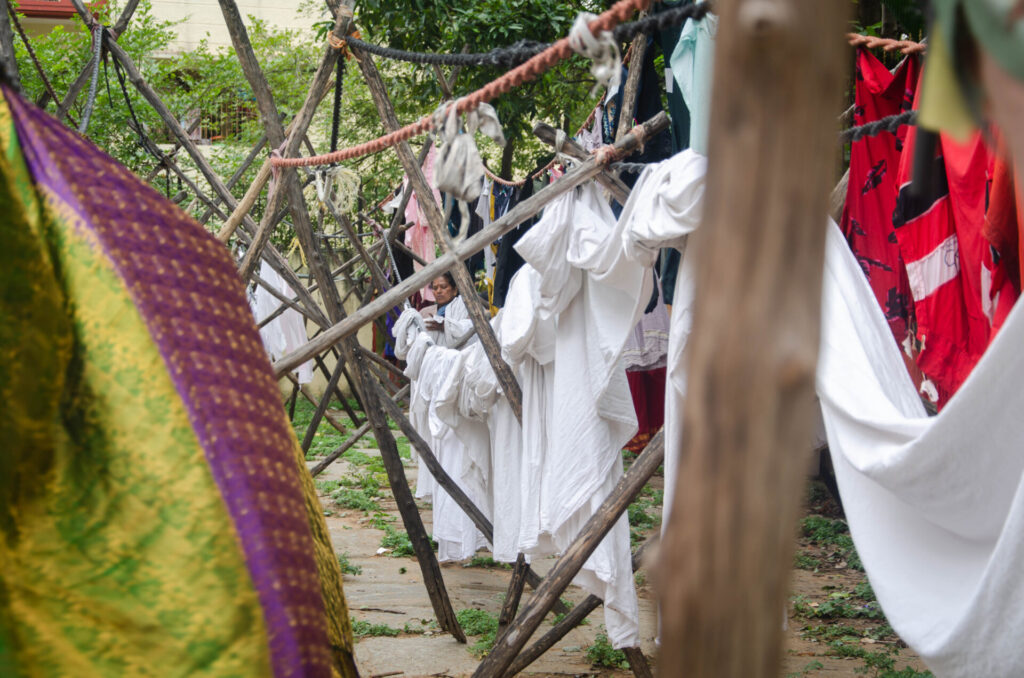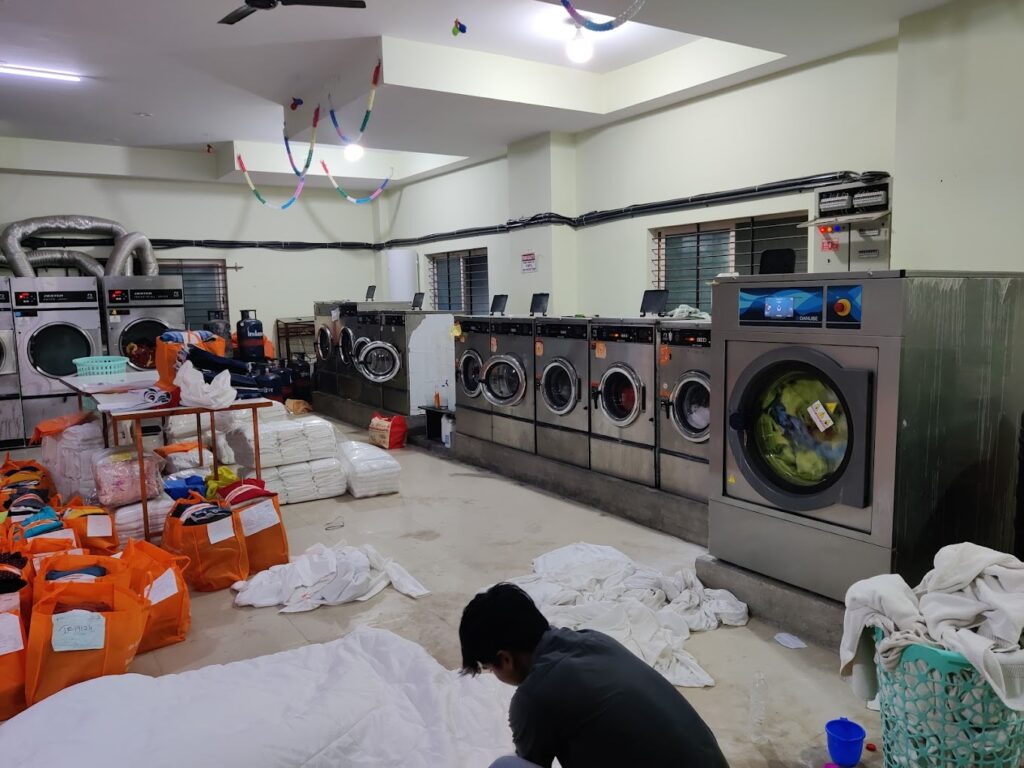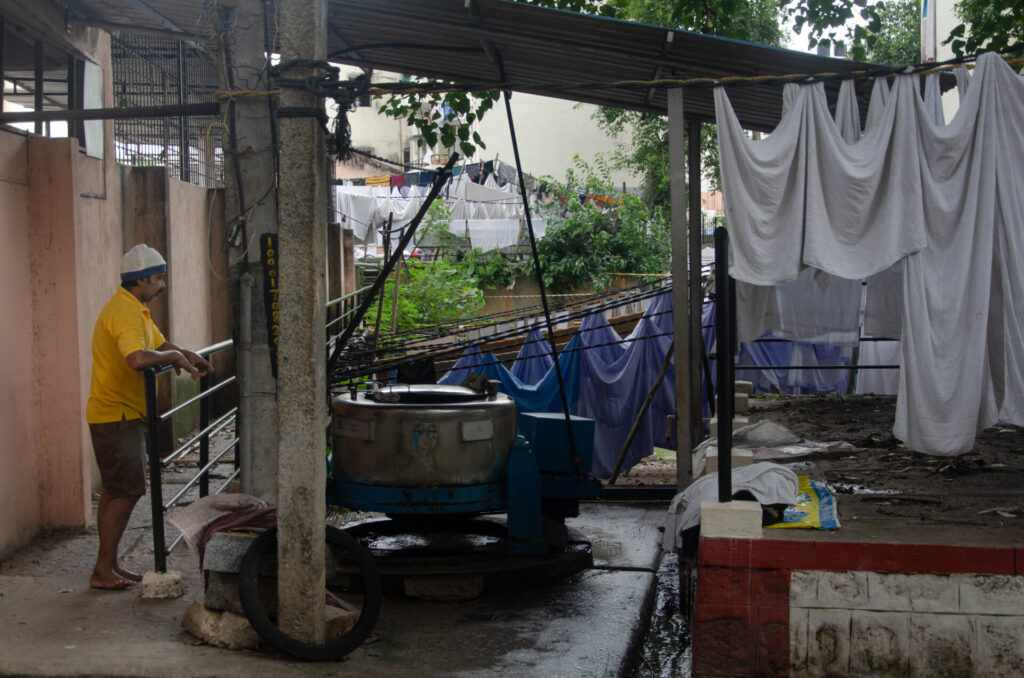In parts one and two of this series, we looked at the condition of the 30 dhobi ghats in the city and why there isn’t a single functioning water recycling plant to solve the issue of water scarcity. In this third and final part, we will look at how the rise of laundry brands are becoming a severe threat to traditional dhobi ghats and the dhobis’ livelihood.
With the majority of dhobi ghats relying heavily on manual washing and minimum use of technology, the emergence of laundry brands, which use and advertise technological tools to entice more customers, is posing a threat to the livelihoods of the traditional dhobis.
“Our target audience is those who seek convenience and are willing to pay for it,” says Uday Vijayan, co-founder and chief marketing officer (CMO) of Laundry Mate.
Laundry Mate is a Bengaluru-based startup that began operations almost a year ago. They provide four services to customers: wash and fold, wash and iron, steam iron, and dry clean. They function via their app.
They pick up and drop clothes from the customers’ places, thus doing away with the need to have any physical stores for customer interaction. They have one large processing unit in Doddaballapura, which can process around 40,000 garments a day.
Laundry Mate is not the only laundry brand in the city. The laundry industry has expanded. The traditional dry cleaner shops have tie-ups with dhobi ghats for the bulk of their work. The e-laundry services, which are booming in commercial areas, take clothes on a kilogram basis and wash them at their stores in washing machines. These services, however, are recommended for daily wear, since these centres do not have manual washing. Some other brands have huge processing units and have both manual washing and washing machines.

Threat of extinction?
Not really, say some dhobis who believe their livelihoods will not be hampered by laundry shops that only have washing machines. “Our livelihood is not impacted by washing machines, since not all clothes can be washed in machines,” says Keshava, president of Bengaluru Dhobi Ghats Association. “Since we promise efficient cleaning, we will not run out of business.”
Although the use of washing machines won’t hamper dhobi ghats, the growth of laundry brands will. “We do not have sufficient facilities at dhobi ghats, which causes a constant problem of irregular income,” says M Narayana, general secretary of Srinagar dhobi ghat, which is functioning for about 53 years. “If this continues, then laundry services too will be privatised by those who have capital, and we dhobis will end up working under them.”
Of the 30 dhobi ghats in the city, only 10 have washing machines and dryers. Vyalikaval is the oldest dhobi ghat, which is about 80 years old.
The remaining 20 continue to practice manual washing, putting them at a disadvantage when compared to companies offering home laundry services. These companies also have B2B tie-ups with restaurants, hospitals, and other sectors.
Read more: Bengaluru’s dhobi ghats keep their legacy afloat
The Vyalikaval dhobi ghat gets about 10,000 to 15,000 clothes per day for washing, while smaller dhobi ghats at Hebbal and Rajajinagar get around 4,000 to 5,000 clothes. On average, each dhobi washes around 400-500 garments in a day.
However, due to low prices, their income remains comparatively less. “Each dhobi decides their prices,” says Renuka Simha, committee member of Rajajinagar dhobi ghat. “While some charge Rs 10 to 15 per piece, others charge Rs 5 to 7 per piece. Prices are further lowered due to customers bargaining, which makes it difficult to earn decent money.”
Skewed competition
From pan-Indian companies to Bengaluru-specific startups, laundry brands are also in competition with each other.
The Laundry Basket is expanding by tying up with other companies, a few guest houses under HAL, and some hospitals, science research centres, hotels, and lodges. “We get around 60 orders each day, and under each order, we get about 20-30 clothes,” says Rajesh Gowda, manager at The Laundry Basket. They have a huge processing unit in Yelachenahalli, and nine other collection points across the city,
The Laundry Basket is confident that their efficient processes will be better than manual washing by dhobis. “There is no guarantee for your clothing washed at local dhobi ghats. They also don’t give any terms and conditions. We, on the other hand, are very organised and are transparent about our processes to the customers,” says Rajesh.

Laundry Mate has around 320 employees. “We have an inspection team, which checks thoroughly for stains besides being in touch with the customers to discuss what services they need,” says Uday.
He doesn’t think that dhobi ghats can compete with them. “Washing machines are our competitor, not dhobi ghats as they are a dying profession. They mostly rely on B2B services, but that is also institutionalised now, where hospitals and hotels have their own laundry set-ups. Though currently we provide only direct customer services, the team aims to extend to company tie-ups as well.”
Fabricspa, a pan-Indian company, a part of Jyothy Laboratories Ltd, has two registered offices in Mumbai and Bengaluru. It is spread across five cities with about 100 outlets. They have a processing centre at Doddaballapura, which gets around 10,000 garments a day. “Some features that will distinguish us from our competitors is that we prioritise hygiene, have great packaging and promise hassle-free laundry,” says one of the heads of the laundry services, who requested anonymity.
The recent extension of another pan-Indian laundry brand in the city, Tumbledry also has around 120-130 stores across the city. However, they are equipped with processing mechanisms at every store. “We get about 100 orders per week at our branch. Apart from our direct customer service, we have tie-ups with salons and are open to any other tie-ups as well,” says Gaurav N, owner of Tumbledry Jayanagar branch.
One of the prominent features of these laundry brands is how they use water. “We recycle 40% of the washed water, and the remaining we use for other purposes,” says Uday.
The Laundry Basket, on the other hand, claims to have a tie-up with the Karnataka State Pollution Control Board (KSPCB) to regulate their washed water. “We store the washed water at the unit and every month the pollution control board will send a van to take away the water for disposal,” says Rajesh.
Health hazards
What dhobi ghats need, most urgently, to fight this competition is adequate facilities to adopt modern tech practices. Though dhobis charge comparatively lower prices than laundry brands, preference for guaranteed service and convenience make customers move away from traditional businesses. “We don’t have a stable income as some months we earn Rs. 8,000 to Rs. 9,000, while some other months, we earn just Rs. 3,000 to Rs. 4,000,” says Narayana.
Challenging the reservation stand by the government in terms of education and subsidies, Mahalingayya, president of Karnataka Rajya Madikatte Ghataka asks why dhobis do not have any reservation despite their financial struggles. “Every community has reservations. We clean medically infected clothes and clothes from death ceremonies, but we have not been recognised for our service,” he adds.
“We also worked like COVID-19 warriors during the pandemic by washing hospital clothes. But neither did the government provide any facilities for that nor have we been recognised,” says Narayana.
Due to prolonged exposure to chemicals, without safety gear and long periods of standing, most dhobis suffer from a range of health concerns. The fumes from bleaching powders and other chemicals have impacted their vision, and a few common health issues they face are cracked hands and feet, spinal problems and varicose veins.
“I cannot eat hot food as my fingertips are burned from regular washing. And due to severe manual labour, my back has been affected,” says one of the dhobis, who works at Ulsoor Dhobi Ghat. Most dhobis said they want a special health card from the government to at least access some health benefits.

In addition to health concerns, the lack of maintenance at dhobi ghats has affected their livelihoods. In Vyalikaval, maintenance of machinery costs around four lakh rupees per year. In Srinagar, electricity costs around Rs 65,000-Rs 70,000 per month. All maintenance charges after free installation by the government are taken care of by the dhobi ghat associations of their respective areas.
“To put each garment in the washing machine we are charged Rs 1.30. Since our earnings vary, on days when we cannot afford the machines, we end up washing them manually, irrespective of our body pain,” says Yashoda, one of the dhobis at Srinagar Dhobi Ghat.
Not surprisingly, few want their children to take up this work. “We are encouraging our children to focus on education as, without development in dhobi ghats, we don’t see the next generation taking up this livelihood,” says Renuka.